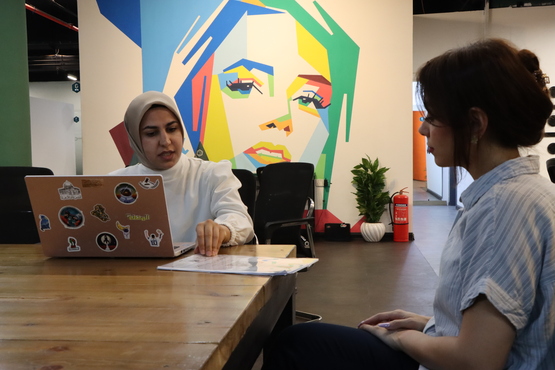Financial Inclusion in Iraq: Women entrepreneurs overcoming challenges with literacy and determination

Despite constant economic change and challenges, the Iraqi entrepreneurial scene has seen significant growth over the past decade. Heavily reliant on oil and public sector employment, the nation is now moving towards a more dynamic private sector. However, many businesses face various challenges in starting and scaling up, including access to finance, investment limitations, stability concerns and a lack of skills and resources.
In order to fuel the Iraqi entrepreneurial scene, GIZ has supported micro, small, and medium-sized enterprises at all stages, from ideation to growth, through business grants and non-financial support such as training, coaching, and mentoring.
One of the entrepreneurs is Saja Abdul Kareem, an attorney who graduated from Baghdad University in 2014 with a law degree and later earned a master's degree in international law from Jordan. Saja and her friends dreamed of establishing a legal business in Baghdad. In 2020, during the COVID-19 pandemic, they launched their online business called Sadeem to provide legal services to individuals and companies. Sadeem offers legal consultation, contract review and contract drafting, all conducted remotely. This approach has enabled them to reach clients outside Iraq who are interested in entering the Iraqi market but are unfamiliar with the local regulations and laws.
Saja had the opportunity to join KAPITA’s ScaleUp Academy in Baghdad supported by GIZ. This programme allowed her to meet ambitious business owners who shared her dream of developing and growing their businesses. Many of these new businesses needed her legal expertise, particularly in registration processes. Saja seized this opportunity and began supporting business owners in registering their businesses. She excelled in this field quickly and now runs her business solo, having grown enough to hire employees in various roles.
As a legal professional without a background in finance, Saja faced challenges in managing her business finances. When Saja heard about a financial literacy training course provided by GIZ in collaboration with the station, she decided to participate.
"One of my biggest challenges when I started my business was managing the finances," Saja says. "As someone without a finance background, I decided to hire an accountant. However, the accountant could not advise on growth opportunities through adapting new financial services or certain budgeting adjustments. That is why I believe business owners need essential financial skills, as they know their business better than anyone. The financial literacy training helped me gain this knowledge."
The financial literacy training covered budgeting, investment strategies, navigating loans and financial transactions, allowing participants to learn about available tools to make informed financial decisions. Saja now uses electronic wallets to transfer employees' salaries, which helps her manage payroll more efficiently. She is also in the process of setting up a business bank account instead of relying on a personal account, believing it will be crucial for tracking revenue and enhancing her credibility when working with companies, especially outside of Iraq.
"The training provided me with insights and valuable information about different types of electronic payments and their advantages for businesses," Saja explains. “For women entrepreneurs, especially those running online businesses from their homes, online payment methods offer significant benefits. Cash payments can be challenging and may require sharing personal contact information and addresses. Online payments provide more privacy and freedom.”
As part of the Team Europe Initiative (TAEUFIQ), GIZ has supported entrepreneurs in building their financial skills. With the right skill set, businesses can navigate confidently in the competitive marketplace and gain access to credit and investment opportunities. Additionally, GIZ continues its support for governmental partners and partners from the financial sector to enhance access to financial services for all.